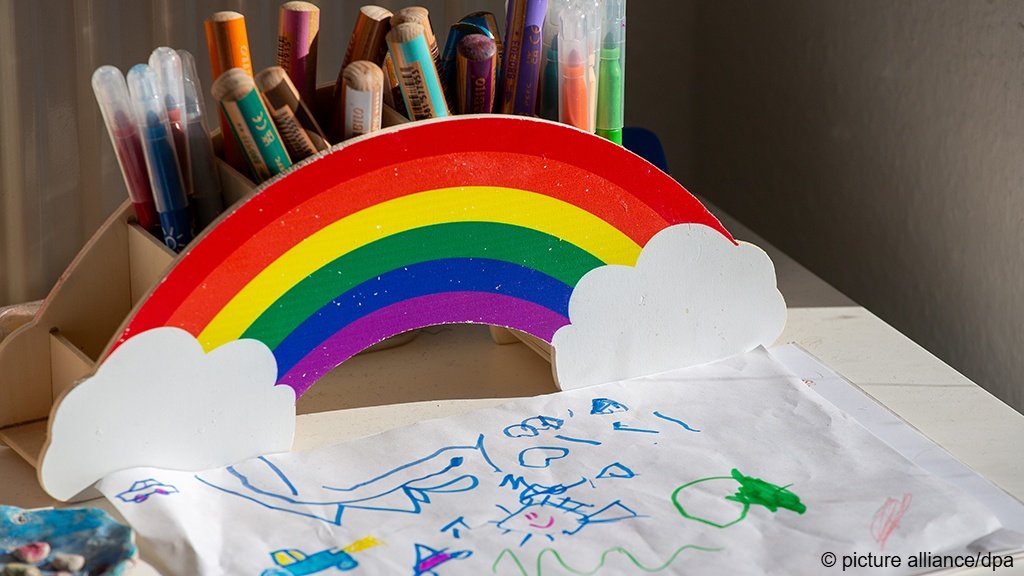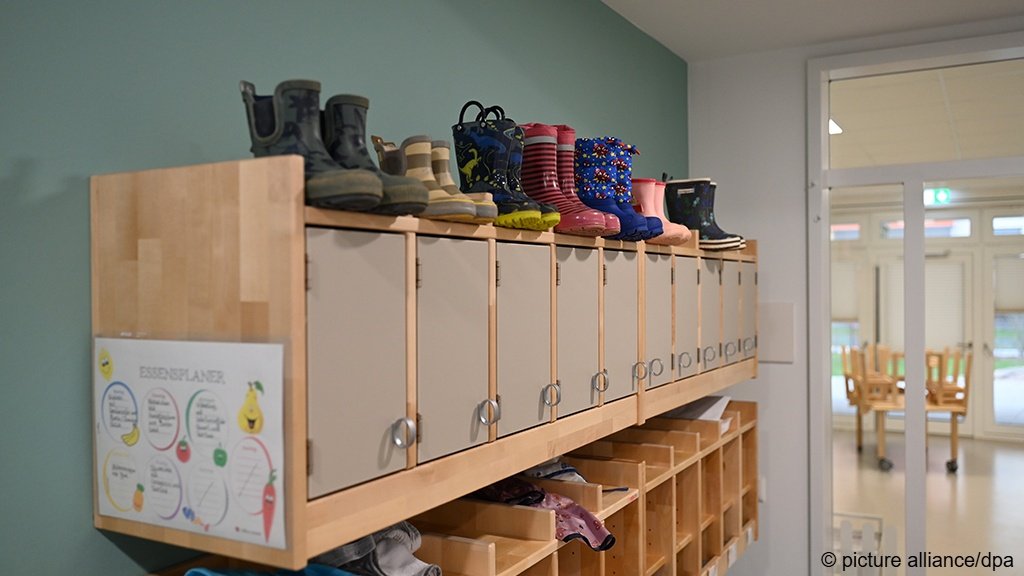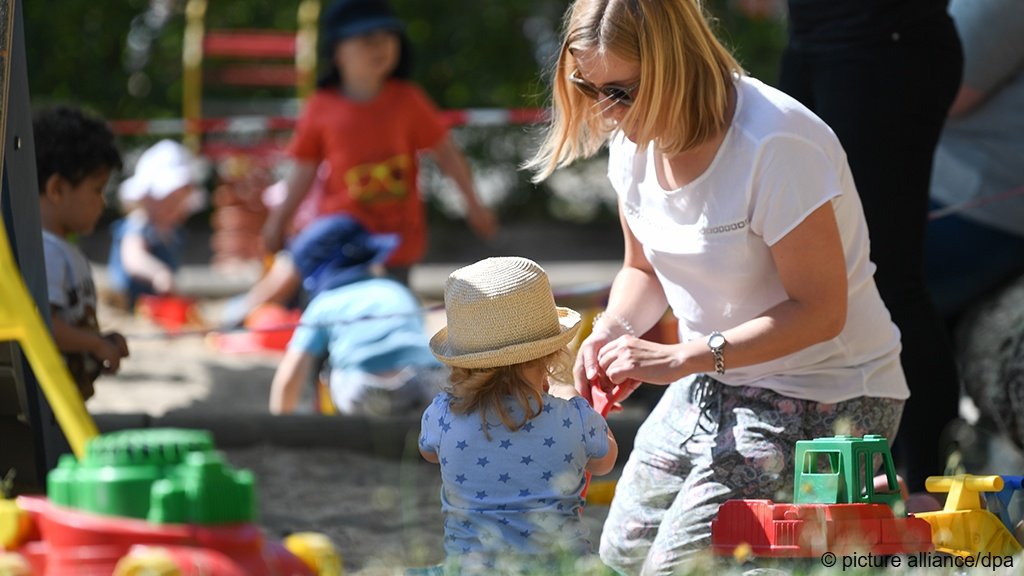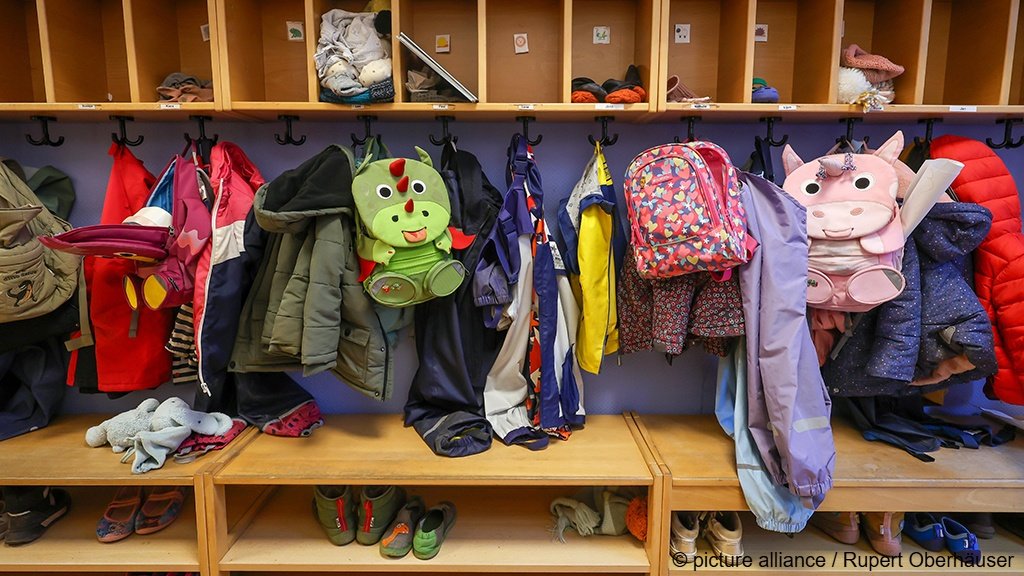A young Afghan woman, who had been working in a German kindergarten and was training to become a fully-fledged nursery teacher, has been sent back to Lithuania, where she already had asylum and the right to work. Her employers have pledged to do everything to try and make her return possible.
"I feel awful. I am crying all the time and I don’t know what to do," Amira* told the German news program Tageschau via telephone last week. Amira, not her real name, left Afghanistan after the Taliban took power, leaving her job there as a kindergarten teacher and her home behind her. Initially, Amira arrived in Lithuania, where she applied for asylum and was granted it.
"I had a permit to stay and to work. But I couldn’t find any work as a kindergarten teacher, there," Amira told Tageschau. And so, the young Afghan woman decided to travel on to Germany.
In 2022, Amira arrived in Offenbach, a small town in Germany’s state of Hesse. Amira began learning German on YouTube, via video, and then enrolled in some language courses, reports Tagesschau.
Read AlsoAfghan family sues German government in attempt to speed up their visa
'She spoke amazingly good German'
When her German was good enough, she applied for a job at "Die Krabbelstubb," a small kindergarten in Offenbach. One of the directors, Hanna Fischer, remembers that they were "impressed" with her application, but wondered whether, with the help of AI and ChatGPT-type programs, she could have just translated it all. They invited Amira for an interview, remembers Fischer, "she spoke amazingly good German, she was so warm, engaged and just lovely, we saw her as an asset," Fischer told Tagesschau.
Things apparently went well for Amira at the kindergarten. She soon had a small group of children for whom she was responsible and started to organize yoga courses. She even began writing the newsletter for the Kita.
"I was happy," said Amira, "I wanted to stay in Germany, to work and to make a difference for the children in my care."
Read AlsoHopes for safety in Germany are fading for Afghan refugees

Deportation 'without warning'
But then, one morning before work, towards the end of May, with no warning, when she was still reportedly in her pajamas, the police arrived at Amira’s house to send her and her brother back to Lithuania. "I was only allowed to take the bare minimum," Amira explains over the phone to Tagesschau, her voice breaking with emotion. "I knew then that the life I had carefully built was over."
Amira explained to the regional news program Hessenschau that, amid her tears, she kept asking the police officers why they were being deported. "We are not criminals, why are you treating me and my brother like this?" she reportedly asked.
Even before she started work in the kindergarten, Amira volunteered with the German Red Cross and with the Catholic charity Caritas, as well as with an environmental organization. "I thought if I integrate, if I learn German and work, then they would let me stay," Amira tells Hessenschau.
Read AlsoWill Germany renege on pledges to take in Afghans?
Dublin regulation
Amira’s deportation reportedly followed the rules of the Dublin agreement, whereby applicants cannot apply for asylum in a second EU state and will be sent back to the state of first entry if they try to do so.
Her deportation is in line with a general tightening of the rules regarding who can stay and who might be sent back either home or to other EU states. On Friday (June 13), the German Protestant press agency EPD reported that the number of Afghan men being granted protection in Germany had also dropped "significantly." Last year, the protection quota for Afghan applicants stood at around 71 percent of cases that were granted protection, and in the first four months of 2025, this protection quota had sunk to about 45 percent, reported EPD, quoting data from BAMF.
Part of the reason for this was that in March 2025, the German government reassessed the situation in Afghanistan and found that for non-vulnerable young men, a return to Afghanistan would not present a particular danger. This assessment has led to a higher percentage of claims to need protection being refused.
The Linke (Left) party has criticized this decision, saying that the situation has not really changed in Afghanistan. The Linke are also supporting Amira's case. A former leader of the party and German MP, originally from the state of Hessen, Janine Wissler has posted about Amira's case on her Instagram page, along with the local Offenbach Linke party members.
The German Federal Bureau for Migration and Refugees (BAMF) told Tagesschau when asked about the case that although they couldn’t comment on individual cases, as a general rule, being deported or granted asylum did not depend on whether someone has learnt German or is more or less integrated. "This has no influence on the asylum process," they reportedly stated.
"The BAMF authorities just check whether a person would be in danger if sent back to the land were they came from," stated BAMF. For Amira’s case, as far as the kindergarten directors understand, the BAMF decided that she had both protection and the right to work in another EU country, Lithuania, and therefore she didn’t need to stay in Germany according to the authorities because she, in theory, could do everything she does in Germany in Lithuania. That’s why a second application for protection in Germany was refused, because she already possessed one for Lithuania.
In the first quarter of 2025, Germany deported more than 6,000 people for various reasons from Germany. That is almost a quarter more deportations than the previous year.
'We had already planned her in as a member of staff'
Amira was about to complete a two-year-long practical training to be certified as a kindergarten teacher. "We had already planned her in as a permanent member of staff," says the kindergarten business director, Bastian Klinzing.

Amira herself hoped that learning German, showing a willingness to work and societal engagement would demonstrate that she had a right to stay and a future to build in Germany. But now she feels that all her efforts were for nothing. "I didn't believe that one can fall so low, even when you try and do everything right," she tells Tagesschau.
Amira’s employers at the kindergarten are reportedly in a similar state of shock. "We were speechless," explains Fischer, on hearing the news of Amira’s deportation. The children and their parents were all asking, "Where is Amira?"
Read AlsoGermany: Jet carrying at-risk Afghans stirs debate
Kindergartens facing shortages across Germany
German kindergartens, like many other sections of society, particularly in the caring professions, are facing staff shortages. Relatively low pay and long hours and a high degree of responsibility have rendered many of these professions unattractive to anyone but the most dedicated. "We are always talking about skilled staff shortages," comments Klinzing, "And then they send back someone like Amira? It is really frustrating."
According to Frankfurter Rundschau, quoting the German Association for Kindergartens (Deutsche Kitaverband, DVK), kindergartens in the Hessen region are short of about 10,000 staff members. DKV describes this lack as "dramatic."
Across Germany, according to a study from 2024 published by the Paritätischen Gesamtverband, each kindergarten is missing on average two key workers. This lack is having consequences; some German kindergartens are being forced to reduce their opening hours or cut back on the quality of the services they can offer, states the association.

The DKV has called on the German government to make some reforms to improve the situation, including making the process of recognizing foreign qualifications clearer, and giving nurseries and kindergartens the possibility to recruit outside of the EU.
Read AlsoHassinah Rezaei: From Afghanistan to Germany, a story of resistance, hope and a new beginning
Is a return possible?
In theory, there is one way that Amira could get back to Germany, via a work visa. Her employers would need to prove that Amira is crucial to the functioning of their kindergarten, but often, when someone is deported, there is a block on them returning to the country for a certain amount of time. Hessenschau could not establish for exactly how long, or if, that is the case with Amira.
Now in Lithuania, Amira is living in an asylum center with her brother. She says that the conditions are "difficult," reported Tagesschau. "I can’t think clearly. I am really confused, I keep just hoping that this situation is not my reality."

Amira says she is missing the children, the kindergarten and the team with whom she worked. Amira felt that she faced so many challenges as a woman in Afghanistan and she had really hoped that things would be different in Germany. "I really felt like I had arrived. But now I have to start all over again from scratch," Amira told Tagesschau.
Amira and the kindergarten management team are still hoping that things might change. "I just hope that they look at my individual case and not just at what is on the papers," says Amira. The young Afghan woman only has protection in Lithuania until 2027, and then she is worried about what might happen after that.
"I just want to come back to Germany, to finish my training, it was always my dream to stay in Germany," explains Amira. "I really invested a lot in my life in Germany. I spent so many nights trying to learn German, and I really tried to fit in. Is it all for nothing?"
*Name changed by Tagesschau to protect her identity
Read Also
